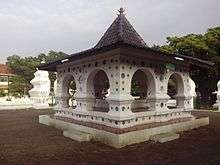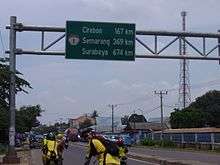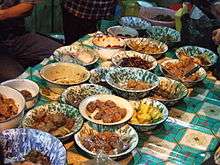North Coast (West Java)
The North Coast region is the flatland region in the north of Western Java, Indonesia. The region is on the Java Sea coast, between the Greater Jakarta metropolitan area in the west and Central Java in the east.
Cities

- Cikampek — transport hub at a junction of motorways and railways.
- 🌍 Cirebon — the 'city of shrimps': the largest city of the region, with two sultan palaces.
- 🌍 Indramayu — surrounded by mango plantations, and beaches on the Java Sea coast.
- 🌍 Karawang — satellite city of Jakarta.
- Pamanukan — another town with Java Sea coast beaches.
- 🌍 Rengasdengklok — town where Indonesia's proclamation of independence was first drafted.
Understand

In contrast to most of West Java province, the North Coast region is largely flat. This travel guide covers this flatland area, with the exception of the parts that are part of the Greater Jakarta metropolitan area in the west. The region includes the regencies of Karawang, Indramayu, Cirebon, and the northern flatland parts of Subang and Majalengka, as well as the independent city of Cirebon.
Parts of the region are believed to have been part of the Tarumanagara Kingdom from the 4th to the 7th century. Afterwards, for almost 1000 years Western Java has been dominated by the Sunda Kingdom (based in Bogor Raya) and the Galuh Kingdom (based in East Parahyangan), until the Sultanate of Cirebon was established in 1445. This was one of the earliest Islamic states in Java, and it has had a lasting influence. From the 16th century, European colonists came to Java, and by the early 17th century the Dutch had settled in Batavia (Jakarta). For two centuries, the Dutch administration tolerated the sultans of Cirebon, but their power steadily decreased. By the early 19th century the sultanate only still existed as a protectorate under Dutch rule.
After Indonesian independence the region became part of the province of West Java. In recent years, there have been proposals of separating a new province of Cirebon from West Java. Cirebon province would then encompass most of the areas that were part of the Sultanate of Cirebon, and include the eastern part of the North Coast region, as well as the north of East Parahyangan.
For many Indonesians, the region is mostly known because of the major trunk road of the North Coast Route (Jalur Pantai Utara, or abbreviated Pantura). This National Road 1 has traditionally been the main road from Greater Jakarta to Central and East Java, and all towns along the route therefore had many rest areas, hotels, and roadside food stalls. Especially during the annual holiday at the end of Ramadan this road is used by millions of people, and therefore also very congested. In recent years, new tolled motorways have been opened, so the role of Pantura (at least in Western Java) has decreased.
Get in
By car

Cikampek is at a junction of toll roads, with Tol Jakarta-Cikampek leading to Cikampek from the west, Tol Cipali continuing to the east (to Cirebon and Central Java), and Cipularang to the south (to Purwakarta and Bandung). In addition to the toll motorways, the original North Coast Route trunk road is still important to reach places like Pamanukan and Indramayu,
By plane
There is no airport with scheduled flights in the region. The nearest airports are in Greater Jakarta and in Bandung. Jakarta's Soekarno-Hatta International Airport is the busiest airport in Indonesia. There is a direct DAMRI minibus connection from the airport to Karawang, operated about once per two hours during daytime. To get to other places in the North Coast region from the airport by public transport, you will need to go to one of the bus terminals or railway stations in Jakarta first.
By train
The main railway serving the North Coast region is the major west-east Jakarta-Central Java railway. The busiest stations are Cirebon's central station and Jatibarang station near Indramayu, with both of these stations offering frequent connections to Jakarta and Central/East Java, as well as a few daily trains to Bandung. The railway station of Cikampek also sees relatively many trains, because it is at the junction of the west-east railway and the railway to the south (to Bandung).
By bus
Karawang, Cikampek, and Cirebon have large bus terminals, with many connections to and from destinations throughout Java. Connections to other places are more limited, but most towns have at least connections to Jakarta. Otherwise you can transfer at one of those three large bus terminals, which have good connections because they are next to the tolled motorway.
Get around
The larger towns and cities are interconnected by a network of buses, and a few daily trains connect Cikampek and Cirebon (and the towns inbetween). Within the city of Cirebon as well as the other larger towns it is easy to get around using a dense network of angkot (public minivans). To and within more remote areas of the region, public transport is more limited. Traffic congestion is common, and especially the toll motorways are very busy during weekends and holidays.
The availability of taxis is quite limited throughout the region, and many taxi drivers from the Greater Jakarta area may be unwilling (or not allowed by their companies) to go as far as Karawang. However, you can hire an ojek (motorcycle taxi), which are usually available at all major street corners. Other transport options in some places include becak (bicycle rickshaws).
See
Historic sights
.jpg)
There are many historic sights in the North Coast region, from various periods. The oldest sight is the archeological site of the Batujaya temples. It is assumed that the temples in Batujaya were built during the time of the Tarumanagara kingdom in the 5th or 6th century, which would mean they could be the oldest temples in Java.
In Cirebon there are many remnants of the time of the Sultanate of Cirebon (15th to 17th century). For example, there are four sultan palaces (kraton) in the city. The grave of Sunan Gunungjati, who was the founder of both the Sultanate of Cirebon and the Sultanate of Banten in the 15th century, is a local pilgrimage site in Cirebon.
The period thereafter was the colonial time, when the region was part of the Dutch East Indies. In all of the cities and towns in the region there are still buildings in colonial style (mostly railway stations, government buildings, and post offices). Key examples of colonial architecture are the railway station and city hall of Cirebon.
In the region there are also two main memorial sites related to the Indonesian independence (1945), and the following war of independence (1945-1949). The town of Rengasdengklok was the place where the text of the proclamation of independence was first drafted. The house where this was done can be visited, and there is also a monument. The village of Balongsari near Karawang was the location of the Rawagede Massacre of 1947, when the Royal Netherlands East Indies Army killed almost all males of the village. Also there is an impressive memorial monument.
Beaches
Most of the North Coast region consists of flatlands with extensive rice fields, and the number of natural sights is therefore limited. However, of course there are many beaches along the Java Sea coast. Some of the most popular are near Pamanukan and Indramayu. About 40 km off the coast of Indramayu there is also a small uninhabited island that you can visit, and enjoy the beach.
Do
Eat

The traditional food from the region, Sundanese food, is ubiquitous, and can be found everywhere from major hotels to roadside food stalls. The food is characterised by fresh (often raw) vegetables, sambal terasi (chili sauce with shrimp paste), and fried tofu and tempeh. In the eastern part of the region (including Cirebon), there are mixtures of both Sundanese and Javanese (Central Java) influence. Considering the proximity to the sea, also fish and sea food are popular.
The city of Cirebon is known for various special dishes, that are traditionally only eaten in that region. An example is nasi jamblang: a buffet with dishes such as tofu vegetables, liver or meat stews, potatoes, fried eggs, cooked chili, stewed fish, etc. Key characteristic is the use of teak tree leaves to pack the rice. The town of Rengasdengklok is known for a special green-coloured pancake snack, serabi hijau.
Drink
Stay safe
Go next
- Greater Jakarta — one of the largest urban areas in the world.
- Parahyangan and East Parahyangan — the mountainous area to the south.
- Tegal — nearby city just across the border in Central Java.